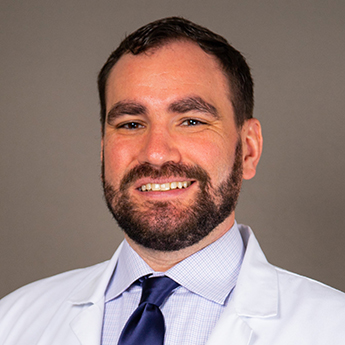Member of the Month: Jim Fahey, MD
New physician in the Valley advocates for the underserved
By Samantha White

Jim Fahey, MD, is faculty at the University of Texas Rio Grande Valley, where he also completed his own family medicine residency. There he precepts residents, teaches clinical skills to pre-clerkship students, directs the program’s annual family medicine research symposium, cares for patients at the program’s clinic, and more. As a new physician member of TAFP, Fahey is in his first seven years of practice.
Who or what inspired you to become a family physician?
In undergrad, I had the opportunity to volunteer at a community health clinic as part of a medical Spanish course and continued to volunteer there throughout the remainder of my college years. It was at this clinic where I learned of the importance of preventive care, chronic disease management, establishing rapport with patients over the long term, and the importance of teaching behavioral health strategies to enact lifestyle changes. This experience inspired me to become a family physician.
Back in May, you attended AAFP’s Family Medicine Advocacy Summit in Washington, D.C., as a representative of TAFP. What was that experience like?
Attending AAFP’s Family Medicine Advocacy Summit was a great experience that I encourage for all residents and attendings. Along with my other colleagues from Texas, we had the opportunity to advocate directly to our senators’ and representatives’ staffers for bipartisan policies and bills that directly affect the practice of family medicine and our patients. Walking through the halls of Congress was a new experience for me and encouraged me to continue to advocate for family medicine and our patients back home. I was able to meet a wide variety of physicians from across the country and was encouraged by our combined efforts for meaningful change.
Why is advocacy personally important to you?
Advocacy is personally important for me due to the daily struggles I encounter as a family medicine physician working to navigate the system with my patients and learners, especially in an underserved area like the Rio Grande Valley. Increased investment in primary care has the potential to save health care costs while improving health outcomes for our patients, but that investment will not come without advocacy. Reducing the burdens for patients and physicians trying to access guideline-based care and increasing the primary care workforce are also essential to improve our health care system. I have many patients with and without insurance who have great difficulty accessing necessary care in a timely manner and as a family medicine physician, I am able to bring these personal stories to our elected officials.
Why do you choose to be a TAFP member?
In my experience as a family medicine resident and attending physician, TAFP has done a great job of actually representing my interests. They help provide funding for conference attendance to residents and are actively involved in advocacy for family medicine physicians and our patients at the state and national level. I’ve also found TAFP to provide high-quality and timely communications relevant to the practice of family medicine.
What do you enjoy doing outside of medicine?
Outside of medicine, I enjoy spending time with my wife and our four cats, as well as family and friends. I enjoy traveling, listening to music, going to the movies, and trying new restaurants and food. I have recently gotten back into running, which is great stress relief and am training for a marathon relay with friends from work.
TAFP’s Member of the Month program highlights Texas family physicians in TAFP News Now and on the TAFP website. We feature a biography and a Q&A with a different TAFP member each month and his or her unique approach to family medicine. If you know an outstanding family physician colleague who you think should be featured as a Member of the Month or if you’d like to tell your own story, nominate yourself or your colleague by contacting TAFP by email at tafp@tafp.org or by phone at (512) 329-8666.